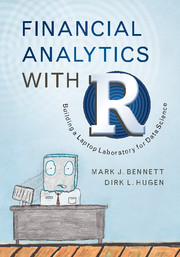Book contents
- Frontmatter
- Dedication
- Contents
- Preface
- Acknowledgments
- 1 Analytical Thinking
- 2 The R Language for Statistical Computing
- 3 Financial Statistics
- 4 Financial Securities
- 5 Dataset Analytics and Risk Measurement
- 6 Time Series Analysis
- 7 The Sharpe Ratio
- 8 Markowitz Mean-Variance Optimization
- 9 Cluster Analysis
- 10 Gauging the Market Sentiment
- 11 Simulating Trading Strategies
- 12 Data Exploration Using Fundamentals
- 13 Prediction Using Fundamentals
- 14 Binomial Model for Options
- 15 Black–Scholes Model and Option-Implied Volatility
- Appendix Probability Distributions and Statistical Analysis
- References
- Index
4 - Financial Securities
Published online by Cambridge University Press: 20 October 2016
- Frontmatter
- Dedication
- Contents
- Preface
- Acknowledgments
- 1 Analytical Thinking
- 2 The R Language for Statistical Computing
- 3 Financial Statistics
- 4 Financial Securities
- 5 Dataset Analytics and Risk Measurement
- 6 Time Series Analysis
- 7 The Sharpe Ratio
- 8 Markowitz Mean-Variance Optimization
- 9 Cluster Analysis
- 10 Gauging the Market Sentiment
- 11 Simulating Trading Strategies
- 12 Data Exploration Using Fundamentals
- 13 Prediction Using Fundamentals
- 14 Binomial Model for Options
- 15 Black–Scholes Model and Option-Implied Volatility
- Appendix Probability Distributions and Statistical Analysis
- References
- Index
Summary
The benefit of studying securities along the lines of this chapter is a better understanding of the relationships between the various securities in the financial markets.We begin with some basic quantitative aspects of bonds and stocks and then move to a narrative about events from recent history. Many of us were impacted by these adverse events. If we were not affected, we probably know somebody, maybe a good friend or loved one, who was: they lost their retirement nest egg or their job. As we look back on these stories, we can see why having financial analytic skills in our background can help us. We need to understand the individual security statistical behaviors and their interrelationships: this is key in the complex world we live in. Indeed, just to manage our own portfolio toward our children's future school funding, budgeting for an aging relative or our own eventual retirement, requires this knowledge, especially in these days of minimal return on savings accounts.
There are many stories of fortunes made and lost in securities trading. From our personal experience, on a business trip from Chicago to New York, a Chicago-based taxi driver was asking questions about securities markets and seemed to know quite a bit about them. As the luggage was retrieved from the taxi cab trunk at the airport drop-off spot, he revealed that he busted some years back in the volatile Chicago commodities markets and needed to find a new way to make a living: from trader to taxi driver. This can happen.
In the past few decades, securities price discovery has gone from human conversations, often loud and dynamic, to quiet devices sending signals over a computer network. Securities are different from most products we encounter in that their prices fluctuate continuously during trading hours. Therefore, analyzing securities prices is a study of random processes. The mathematical study of randomness predates our modern investment banks and computerized exchanges.
We will distinguish between the most basic securities whose prices are quoted – underlying securities – and those securities whose value is derived from those basic securities – derivative securities. Basic securities include stocks, bonds, and spot commodities which are priced in the present.
- Type
- Chapter
- Information
- Financial Analytics with RBuilding a Laptop Laboratory for Data Science, pp. 44 - 76Publisher: Cambridge University PressPrint publication year: 2016



